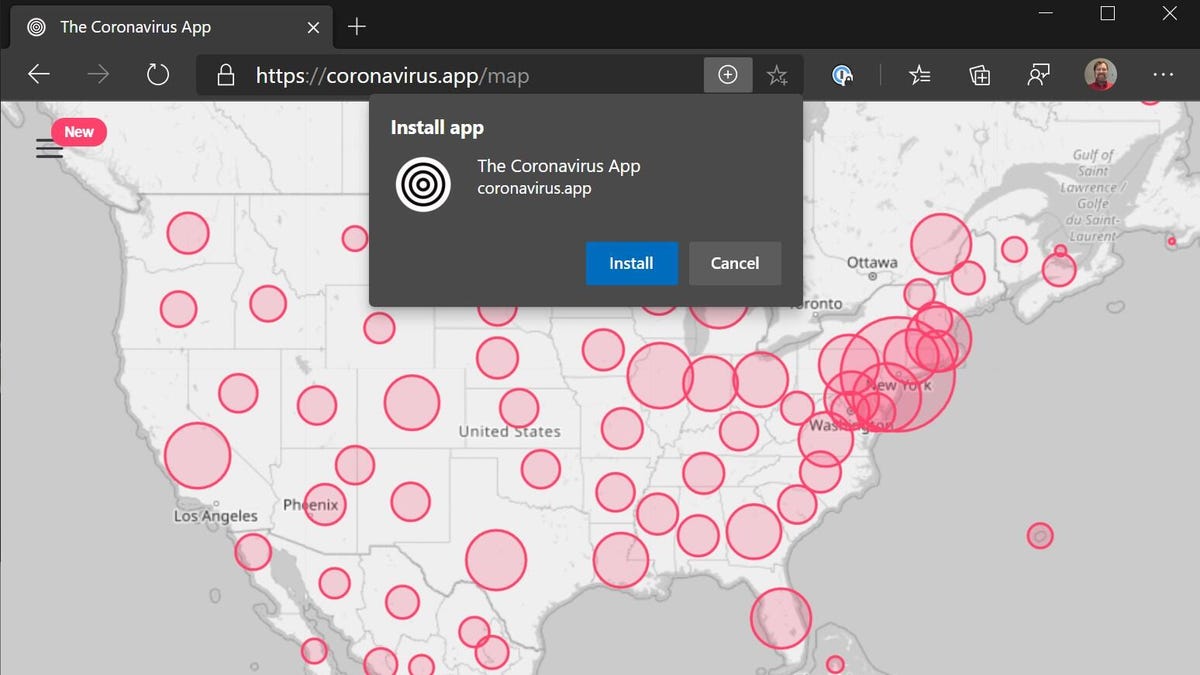Microsoft, no longer fearing the web, gives it a new boost on Windows
Web apps will fit in better with Windows 10. Also, the new Edge browser is coming to more PCs, Microsoft announces at Build.

The Coronavirus.app web app can be installed on a PC or phone so it works more like a native app.
Web apps, websites that can be converted into standalone apps, are moving closer toward becoming first-class software citizens on Windows 10 .
Google coined the term progressive web app, or PWA, to describe websites that can assume the power and prominence of conventional native apps you'd download from an app store. For a taste of PWAs, visit coronavirus.app, which with most browsers will ask if you want to download it to your desktop or home screen so you can use it again easily. Or head to app.starbucks.com, where you can browse the Starbucks menu and place an order.
On Tuesday, Microsoft said that its Windows 10 operating system and new Edge browser will allow you to uninstall web apps the way you would regular Windows software. You'll also be able to manage web apps in settings and to share content with web apps the way you can with ordinary apps. Microsoft unveiled the changes at its annual Build developers conference.
Today, web apps can feel like they don't quite fit in, said Chuck Friedman, corporate vice president of Microsoft's Edge browser, but Microsoft hopes to change that. "We're quite excited about making web applications feel more native inside the Windows environment," he said.
The features are in testing in the Canary version of Edge and Windows Insider preview versions.
The move is part of Microsoft's enthusiastic embrace of web technology over the past few years. The software giant's recent approach, which stands in stark contrast to the company's concerns in the 1990s that the web might encroach on Windows' turf, comes as the operating system competes with mobile OSes, like Google's Android and Apple's iOS and iPadOS. All of those operating systems employ web technology.
Chromium-based Edge moves to more PCs
Microsoft has begun a major push to overhaul its Edge web browser, which had been based on a stripped-down core of its older Internet Explorer browser. Microsoft ditched that approach, though, because it was spending too much time trying to keep up with Google's Chrome. Now Edge is built on Google's Chromium project, the open-source foundation of Google Chrome and several other browsers.
Microsoft is replacing its old Internet Explorer with a new version of its Edge browser based on Google's open-source Chromium project -- and giving it a new wave-like icon.
Microsoft is actively trying to improve the Chromium core. It's now made more than 3,000 contributions to Chromium, Friedman said.
Microsoft's Chromium-based Edge is available for download. Microsoft is testing it with a gradually larger set of Windows users but hasn't yet started broadly issuing it through its Windows Update service.
"You'll see us increase the speed of that in the next month or two," Friedman said.
Pinterest integration with Edge
Although Microsoft relies on Google for the core of its software, it's trying to make its browser stand out with higher-level features like Collections, a tool to gather information from lots of websites. It's useful for activities like comparison shopping or travel planning.
At Build, Microsoft also announced a partnership with scrapbooking site Pinterest. When you're working with a collection, Pinterest will be able to suggest items that could be of interest. And you'll be able to export collections directly to Pinterest.

